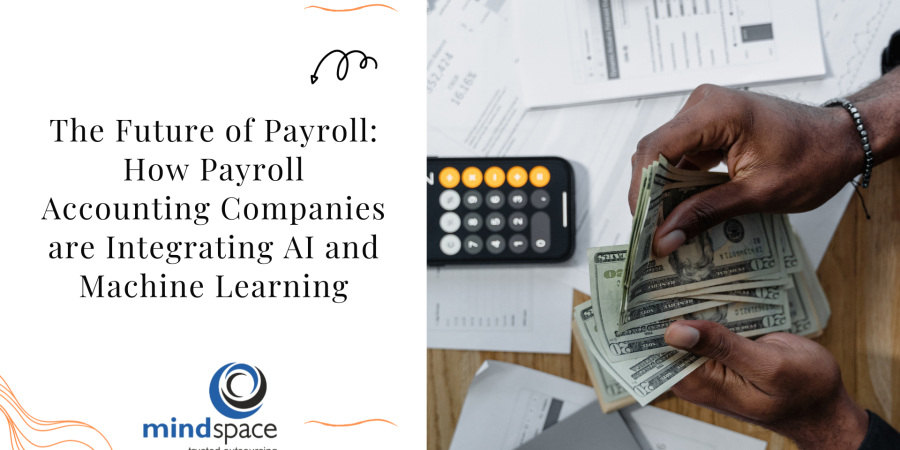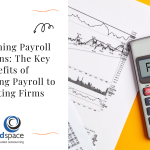The Future of Payroll: How Payroll Accounting Companies are Integrating AI and Machine Learning
In today’s fast-evolving business landscape, the payroll function is undergoing a significant transformation. Traditional payroll processes, which were once manual, time-consuming, and prone to human error, are now being revolutionized by advancements in artificial intelligence (AI) and machine learning (ML). Payroll accounting companies are increasingly integrating these cutting-edge technologies to enhance efficiency, accuracy, and compliance, positioning AI and ML as the future of payroll management.
This article explores how AI and machine learning are reshaping the payroll industry, the benefits they bring to payroll accounting companies and businesses alike, and what the future holds for payroll management as technology continues to advance.
The Evolution of Payroll: From Manual to Automated
Payroll has always been a critical function for businesses, ensuring that employees are paid accurately and on time while staying compliant with tax laws and labor regulations. However, the traditional payroll process is often riddled with inefficiencies, manual errors, and compliance risks. Payroll tasks such as data entry, tax calculations, benefits management, and reporting can be cumbersome and time-intensive, especially for businesses with large or geographically dispersed workforces.
Over the years, payroll technology has evolved from manual paper-based systems to automated software solutions. Payroll software has made it easier for companies to manage payroll tasks, but even with automation, payroll teams still face challenges such as keeping up with changing tax regulations, handling multiple pay structures, and managing global payroll operations.
AI and machine learning are poised to take payroll automation to the next level by introducing more sophisticated tools that can learn from data, make predictions, and optimize payroll processes.
How AI and Machine Learning Are Transforming Payroll Accounting
Payroll accounting companies are adopting AI and machine learning technologies to streamline payroll operations, improve accuracy, and deliver a more efficient service to clients. These technologies offer several transformative capabilities, including:
1. Enhanced Payroll Automation and Efficiency
AI and machine learning can automate repetitive and time-consuming payroll tasks such as data entry, timesheet processing, and tax calculations. Unlike traditional automation, AI-powered systems can learn from data patterns, make decisions, and continuously improve their performance.
For example, AI algorithms can analyze historical payroll data to identify common patterns and trends, allowing payroll systems to automatically adjust payroll calculations based on variables such as employee hours, overtime, bonuses, and tax rates. This reduces the need for manual intervention, speeds up payroll processing, and minimizes the risk of errors.
Additionally, AI can streamline employee onboarding by automating the setup of payroll accounts, tax withholdings, and benefits deductions, freeing up payroll staff to focus on more strategic tasks.
2. Improved Accuracy and Error Reduction
One of the most significant benefits of integrating AI and machine learning into payroll processes is the reduction of errors. Payroll errors can result in costly penalties, dissatisfied employees, and compliance issues. By leveraging AI’s ability to process large amounts of data and identify anomalies, payroll accounting companies can minimize errors in payroll calculations, tax withholdings, and benefits management.
Machine learning algorithms can detect patterns in payroll data that may indicate potential errors, such as discrepancies between reported work hours and actual payments. These systems can flag anomalies for review before payroll is finalized, allowing payroll professionals to correct issues before they become costly mistakes.
For example, if an employee’s hours are incorrectly recorded or a tax deduction is miscalculated, AI-powered systems can identify the inconsistency and alert the payroll team to investigate the issue. This proactive approach significantly reduces the risk of payroll errors and ensures employees are paid accurately and on time.
3. Real-Time Compliance Monitoring
Compliance with tax laws, labor regulations, and reporting requirements is a constant challenge for payroll accounting companies, especially when managing payroll across multiple jurisdictions. Tax laws and regulations can change frequently, making it difficult for payroll teams to stay up-to-date and avoid compliance risks.
AI and machine learning can assist with real-time compliance monitoring by continuously scanning and analyzing payroll data to ensure that it adheres to the latest legal requirements. These technologies can automatically update payroll systems to reflect changes in tax rates, social security contributions, and other regulatory requirements, ensuring that businesses remain compliant without manual intervention.
In addition to monitoring compliance, AI can also generate real-time reports and audits, providing payroll teams with greater visibility into potential compliance issues. This allows companies to address compliance risks proactively, avoiding penalties and legal challenges.
4. Predictive Analytics for Workforce Planning
AI and machine learning are also transforming payroll management by providing predictive analytics capabilities. Payroll accounting companies can use machine learning algorithms to analyze historical payroll data and predict future trends, such as employee turnover, absenteeism, and overtime costs.
By leveraging predictive analytics, businesses can make more informed decisions about workforce planning, budgeting, and compensation strategies. For example, AI-powered tools can predict when an employee is likely to leave the company based on patterns in their payroll data, enabling HR teams to take preemptive action to retain talent.
Predictive analytics can also help businesses optimize their payroll budgets by forecasting future payroll expenses, allowing them to allocate resources more efficiently and avoid overpaying for labor.
5. Personalized Employee Experiences
AI and machine learning are not only transforming the back-end processes of payroll management but are also enhancing the employee experience. By integrating AI into payroll systems, payroll accounting companies can offer personalized payroll services that cater to the individual needs of employees.
For example, AI-powered chatbots and virtual assistants can provide employees with real-time answers to payroll-related questions, such as inquiries about pay stubs, tax withholdings, or benefits contributions. These virtual assistants can handle routine employee queries, reducing the administrative burden on HR and payroll teams.
Additionally, machine learning algorithms can analyze employee preferences and tailor payroll services accordingly. For instance, employees who prefer to receive their paychecks via direct deposit can have their preferences automatically updated in the payroll system. This personalized approach improves employee satisfaction and enhances the overall payroll experience.
6. Fraud Detection and Data Security
Data security is a top concern for payroll accounting companies, as payroll data contains sensitive employee information such as social security numbers, salary details, and bank account information. AI and machine learning technologies can strengthen data security by detecting potential fraud and cybersecurity threats.
AI-powered systems can analyze payroll data in real time to identify unusual patterns or suspicious activities, such as unauthorized access to payroll accounts or unusual payment amounts. Machine learning algorithms can learn from previous incidents of fraud and continuously improve their ability to detect and prevent fraudulent activities.
By integrating AI-driven fraud detection into payroll systems, payroll accounting companies can protect employee data and ensure the security of payroll transactions.
The Benefits of AI and Machine Learning for Payroll Accounting Companies
The integration of AI and machine learning into payroll management offers several key benefits for payroll accounting companies and their clients:
1. Increased Efficiency
AI and machine learning automate repetitive payroll tasks, reducing the time and effort required to process payroll. This allows payroll teams to focus on higher-value activities, such as strategic planning and employee engagement.
2. Enhanced Accuracy
AI-powered systems reduce the risk of payroll errors by automating complex calculations and detecting anomalies in payroll data. This ensures that employees are paid accurately and on time, minimizing the risk of penalties and compliance issues.
3. Improved Compliance
AI and machine learning continuously monitor payroll data for compliance with tax laws and labor regulations. This ensures that businesses remain compliant with local and international laws, reducing the risk of fines and legal challenges.
4. Cost Savings
By automating payroll processes and reducing errors, AI and machine learning can help payroll accounting companies reduce operational costs. Businesses can save money on payroll processing, compliance management, and error correction.
5. Scalability
AI-powered payroll systems are scalable, allowing payroll accounting companies to handle payroll for businesses of all sizes, from small startups to large multinational corporations. As businesses grow, AI can easily accommodate additional employees and jurisdictions without requiring significant manual adjustments.
6. Better Decision-Making
Predictive analytics powered by AI and machine learning provide payroll accounting companies with valuable insights into workforce trends and payroll expenses. These insights enable businesses to make more informed decisions about staffing, budgeting, and compensation.
7. Improved Employee Satisfaction
AI-driven payroll systems offer personalized employee experiences, enhancing communication and transparency. Employees can access real-time information about their pay, benefits, and tax deductions, leading to higher levels of satisfaction and engagement.
The Future of Payroll with AI and Machine Learning
As AI and machine learning technologies continue to evolve, their impact on payroll management will only grow. In the future, payroll accounting companies will likely adopt even more sophisticated AI-driven solutions, such as natural language processing (NLP) for more advanced employee interactions and AI-powered workforce optimization tools.
Additionally, as businesses become more global, AI and machine learning will play a crucial role in managing multi-country payrolls and ensuring compliance across jurisdictions. AI will also enable more proactive payroll management, with systems predicting future payroll needs and automatically adjusting payroll processes to optimize efficiency.
Conclusion
The integration of AI and machine learning is shaping the future of payroll. These technologies are revolutionizing payroll management by automating tasks, improving accuracy, enhancing compliance, and providing valuable insights through predictive analytics. Payroll accounting companies that embrace AI and machine learning are better equipped to meet businesses’ evolving needs and provide a more efficient, accurate, and secure payroll service.
As AI advances, the payroll industry will benefit from greater automation, enhanced decision-making capabilities, and more personalized employee experiences, ultimately leading to a more streamlined and effective payroll management process.


